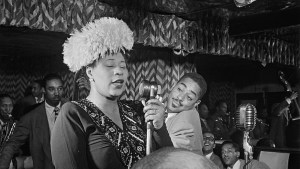The bond music has with our feelings is stronger than any other form of art. It encourages us, comforts us and helps us out. Its effect on our emotional state, thinking abilities, and social skills is impressively powerful, so much that it has even been proved to have healing qualities. Surrounding yourself with musical notes will lead the path to a much more harmonized day, every day.
But more than that, music has been linked to our spiritual self for centuries, since it enhances our feelings and ability to bond with our faith and our community. Not only is it a blessing to pamper our ears, but it may also be the inspiration we need in order to build a better life.
Pope Benedict XVI has spoken about music’s vital connection to the Christian life:
“Music has a spiritual value because it can infuse hope into the human soul. There is a profound and mysterious relationship between music and hope, between song and eternal life. It is no coincidence that Christian tradition shows the spirits of the blessed as they sing in chorus, captivated and enraptured by the beauty of God. But true art, like prayer, is not foreign to everyday reality, rather it calls us to ‘irrigate’ that reality, to make it sprout that it may bring forth fruits of goodness and peace. Music, in fact, has a far greater value because it reminds us furthermore of the value and the universal importance of artistic heritage.”
Indeed music, according to Harvard Medical School, can be a powerful ally for medicine because “music is a fundamental attribute of the human species.” The human brain goes beyond distinguishing it from regular noise to responding to its rhythm, repetition, tone, and tune. Those responses can be measured and driven towards enhancing health and performance, including cognitive function in the elderly or enhancing concentration and focus — which is why surgeons often play music in the operating room. Singing help aphasic patients (people with brain damage that affects language) to recover speech.
Research involving babies is perhaps one of the strongest indicators of our innate our connection with music. Premature infants who were exposed to musical sounds, such as lullabies, were soothed and ate and slept better than babies exposed to the normal noisy sounds of the hospital without music.
Music as therapy
“Music touches people in a way that nothing else can,” shares Leah Morrison of The Music Therapy Center of California, which provides music therapy for emotional, cognitive, psychological and social issues. Unlike the more traditional “talk therapy,” music therapy is a fairly new specialty because it helps relate to client strictly on an emotional level, rather than a rational one. Songs automatically resonate with different feelings, and therefore may help people soothe themselves, think more clearly, and combat an inner struggle without having to put it into words.
How exactly does music affect our brains in such a positive way? It’s believed that music lights up most areas of the brain, therefore provoking a widespread effect. When we listen to a favorite tune, this heightens positive emotions through the reward centers of our brain, stimulating hits of dopamine that can make us feel good.
Beyond just general well-being, music is even being used to treat numerous psychological conditions, such as depression, anger, anxiety, fear, and even happiness, and it’s been show to help improve physical diseases, such as mobility issues. “Typically, the music therapist will create original songs or use the preferred music of the client to assist with their needs,” Morrison explains. The types of patients and their issues vary, from adults dealing with loss, to someone who’s incarcerated, to a patient at a hospital, to a young person in rehab, and even a child with autism. The power to heal emotions, to deal with resignation, to give empowerment and confidence is as big as the number of songs that can be created.
Helping children
Experts are beginning to recognize music as an effective tool to treat children with disabilities, for whom repetition is often central to achieving their particular goals. Morrison talks of one child patient in particular who was diagnosed with echolalia, a psychiatric disorder in which the person meaninglessly repeats or parrots another person’s spoken words. Using visuals and musical phrasing where the child is asked to insert her own words, therapists were eventually able to break the cycle of parroting.
Autism is another condition that responds well to musical therapy, specifically in regard to social skills and connections to others, something that many children on the spectrum struggle with. Songwriting, in which clients help to create a “social song story” for their needs, is one way that’s proving effective, Leah Morrison explains. “For example, if I have a child that is struggling with how to say ‘hello,’ we will sing a ‘hello song’ at the beginning of each session. The reason being, people usually say ‘hello’ right when they first see them … so this fits the natural timing of when the event would occur in real life outside of the session.”
Physical healing
While music is mainly linked to psychological and emotional treatments, new research has shown it to be successful when dealing with physical issues, specially to reduce pain.
Some institutes have started to dedicate efforts to analyze the effect of music on the physical human body, such as at the Berklee College of Music through The Music Therapy Institute, or McGill University in Montreal with the opening of the Music Perception and Cognition Lab. One of the studies performed in this lab reveled that “music was found both to improve the body’s immune system function and to reduce levels of stress. Listening to music was also found to be more effective than prescription drugs in reducing anxiety prior to surgery.” Music increases the antibody immunoglobulin A, and reduces cortisol – the stress hormone. Prof. Daniel J. Levitin, the author of the study, also documented how music can have a neurochemical effect on management of mood, stress, immunity and social bonding.
The use of music as a medical tool goes even further. Vibroacoustic therapy actually allows patients to feel music. The procedure involves the use of a low frequency sound that comes out of speakers embedded to a mat, bed or chair. Vibrations are transmitted to the body, while the patient can also listen to the melodic sound. This therapy has been recommended for people with depression, fibromyalgia and Parkinson’s disease. A study by Lauren King on the short-term effects of vibration therapy on motor impairments in Parkinson’s disease found an important improvement in symptoms, including less rigidity, better walking speed, and reduced tremors. Other researchers are looking to expand this kind of therapy for other diseases, such as Alzheimer.
Music in our everyday lives
We’ve been using music therapy in our lives centuries before it became a clinical practice. Whether to help you mourn a breakup or to charge you up for the big game, quite simply “music lifts your soul,” Morrison adds.
She suggests a dose of music every day to improve your life. “Listen to music, play music, go to concerts, dance! Everywhere and all the time! Find songs that resonate with different feelings you have and make a playlist that you can go to when you feel a certain way. Life happens. Things happen. But music can help you process all of it and make you feel so much better.”

5 ways to incorporate music into your life
- Reduce stress and anxiety by listening to slow tempo and low-pitch music. Choose options without lyrics or loud instrumentation. If you know how to perform, playing an instrument also has a calming effect.
- Improve your memory by studying with music or by singing because it increases dopamine release, which is tied to motivation, learning and memory.
- Exercising while listening to motivational and high tempo music will help you go on for a longer amount of time and make you feel better during the work out and afterwards.
- Preparing yourself to sleep with music in the background reduces stress and anxiety, promoting better sleep patterns and eventually more restful nights.
- Make happiness a healthy habit. Happiness can be enhanced by listening to music that moves you personally, because it causes your brain to release dopamine.
To contact a music therapist in your area,email the American Music Therapy Association.

Read more:
This “miracle song” reduces anxiety in 65 percent of patients

Read more:
2 Studies: Music Heals and Prevents Disease

